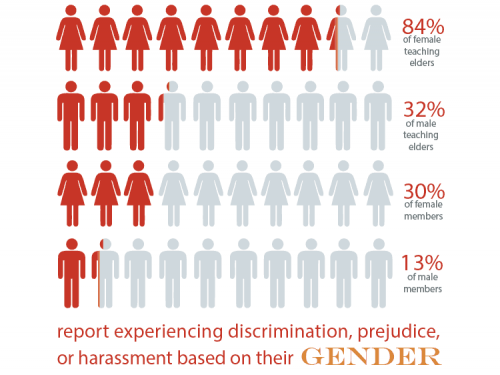Presenters discuss findings of PC(USA) study at the 61st CSW
by Gail Strange | Presbyterian News Service
 NEW YORK – In a room filled with women from around the world, participants attending the opening of the Presbyterian Church (U.S.A.)’s parallel event at the 61st Commission on the Status of Women (CSW) waited expectantly to hear what presenters had to say about gender discrimination within the Presbyterian Church (U.S.A.)
NEW YORK – In a room filled with women from around the world, participants attending the opening of the Presbyterian Church (U.S.A.)’s parallel event at the 61st Commission on the Status of Women (CSW) waited expectantly to hear what presenters had to say about gender discrimination within the Presbyterian Church (U.S.A.)
The audience listened intently as Deb Coe, coordinator, and Angie Andriot, research associate, of PC(USA) Research Services presented information on the topic “Hidden Sexism in a Progressive Denomination: Member Perception verses Pastor Experience.”
In 1956 the denomination was among the first to ordain women as ministers of Word and Sacrament. However, today only 38 percent of women serve as ministers of Word and Sacrament, although they make up nearly 60 percent of the denomination.
Coe pointed out that while women represent a larger percentage of the population of the church they are under represented as ministers and furthermore the 2016 PC(USA) study on Gender and Leadership highlighted the fact that as many as 84 percent of the female teaching elders feel they have experienced some form of sexism.
Coe began the presentation by asking the audience to take part in a brief survey to learn if the women in the room had firsthand knowledge of any of the same experiences the denomination’s gender and leadership study exposed.
As Coe continued with her presentation, she shared quotes from women in church who participated in the survey.
“Women of all ages and roles in the church participated in this survey,” Coe said. “We surveyed female deacons, elders, pastors and volunteers. We wanted to include every position of the church. As important as this work is, we still experienced a great deal of resistance to the survey.”
According to the findings, 48 percent of men and about 41 percent of women disagree with the statement that “gender inequality is still a problem in the PC(USA).” Coe said these findings are likely because the problem is less pervasive among lay members. Only 30 percent of women and 13 percent of men report experiencing gender discrimination, harassment or prejudice. Still, Coe reminded the audience that these numbers should be zero.
Coe and Andriot shared the following quotes from survey participants:
- Many women are trying to swing the pendulum the opposite direction beyond equality to superiority.
- Men and women work well together in ministry when they accept the gifts both can bring.
- Women on an agenda are quite off-putting to other women, men and congregations in general. It is not the spirit of equality.
- Many women look for a fight that doesn’t exist in many cases.
Another quote was even more expressive of the divide, saying, “Some use gender as an excuse for their ineffectiveness in ministry. Others spend too much time on surveys and trying to make issues more important than the work of the church. If you need something to do—go volunteer!”
When asked where do we go from here Coe said, “We now have data to expose the problem; the next step is consciousness raising. You cannot mobilize people for change if they don’t agree that there’s a problem.”
Adriot said, “Our job is to serve as a resource to those wanting to make a change in the church and to help the church truly become God’s beloved community for all.”
The Presbyterian Church (U.S.A.) has been involved with the United Nations since before the UN was officially formed. The Presbyterian Ministry at the United Nations represents the policies of the Presbyterian Church (U.S.A.) General Assemblies within the United Nations community.
![]() You may freely reuse and distribute this article in its entirety for non-commercial purposes in any medium. Please include author attribution, photography credits, and a link to the original article. This work is licensed under a Creative Commons Attribution-NonCommercial-NoDeratives 4.0 International License.
You may freely reuse and distribute this article in its entirety for non-commercial purposes in any medium. Please include author attribution, photography credits, and a link to the original article. This work is licensed under a Creative Commons Attribution-NonCommercial-NoDeratives 4.0 International License.
Categories: Women’s Ministries
Tags: commission on the status of women, csw61, discrimination, equality, gender, leadership, ordination, pcusa, presbyterian, presbyterian ministry at the united nations, research services, united nations, Women
Ministries: All Women in the Church, Research Services, Presbyterian Ministry at the United Nations, Advocacy Committee for Women and Gender Justice (ACWGJ), Gender, Racial and Intercultural Justice, Presbyterian Women, Racial Equity & Women’s Intercultural Ministries, Leadership Development for Leaders of Color, Women’s Leadership Development and Young Women’s Ministries